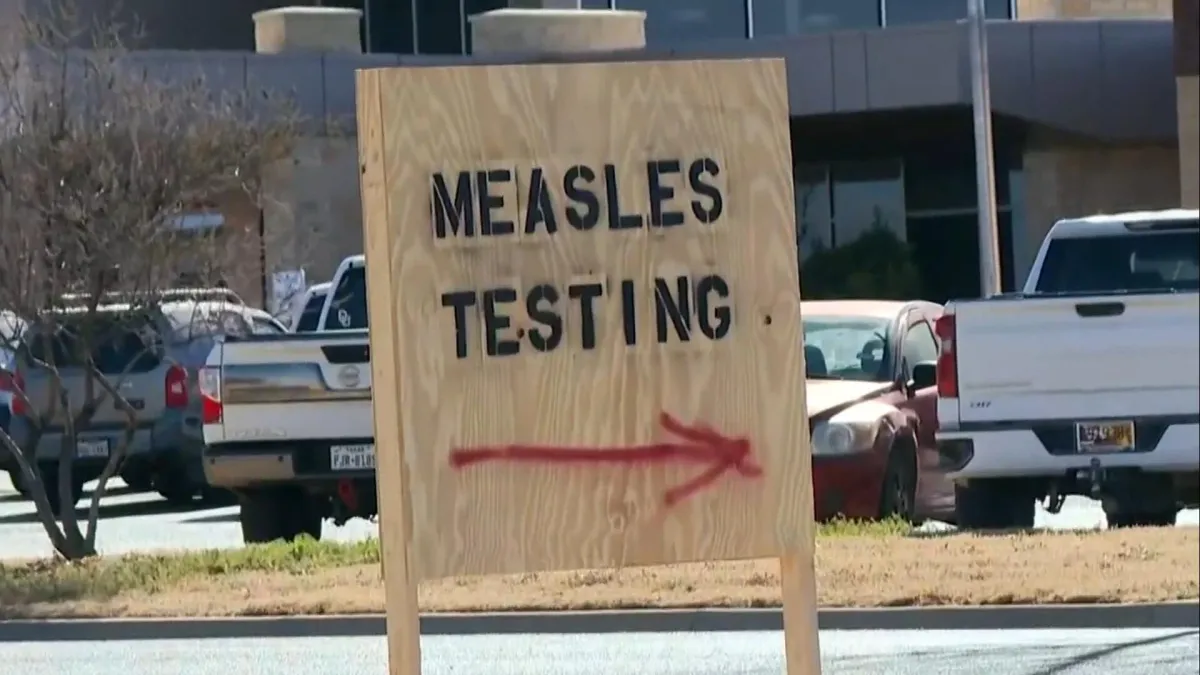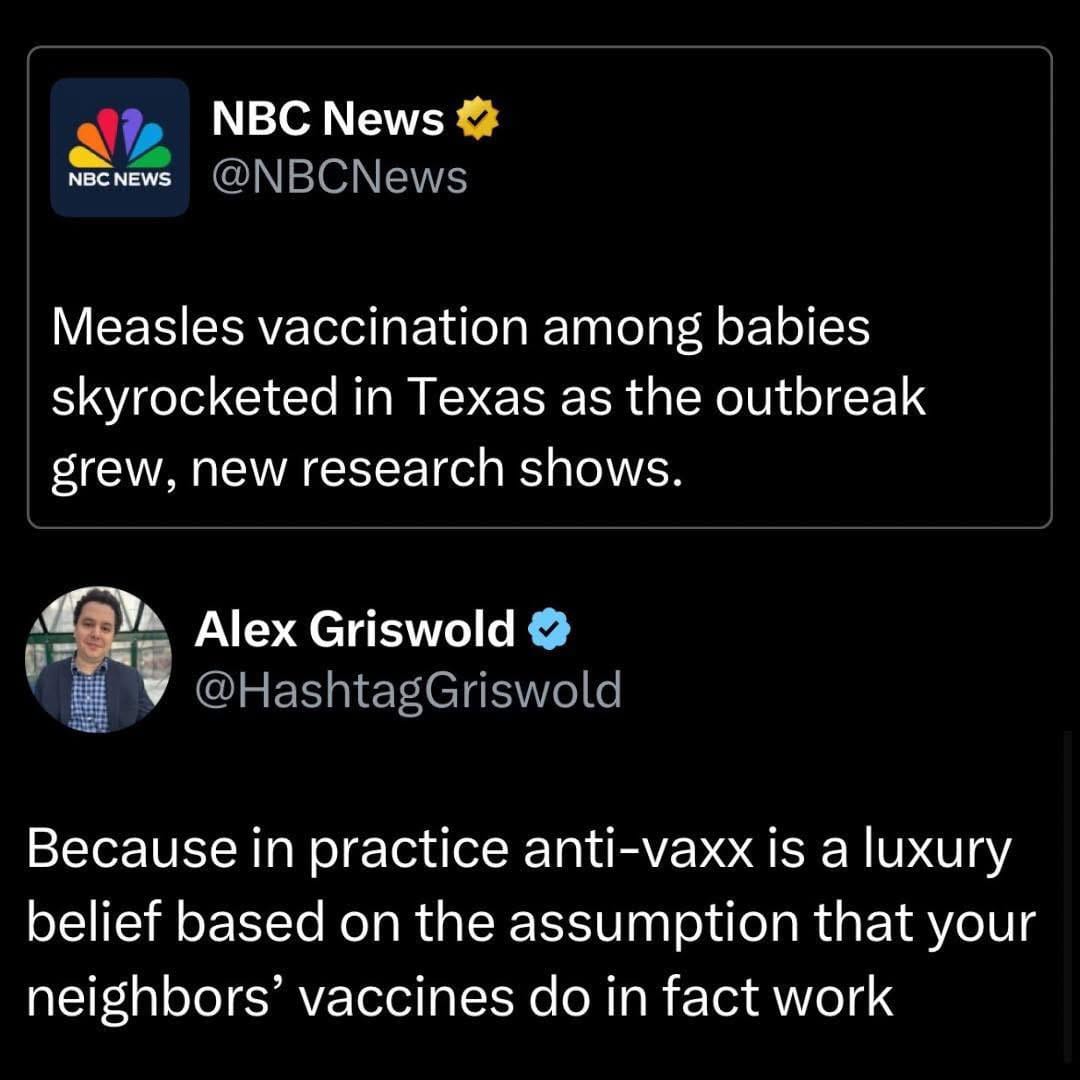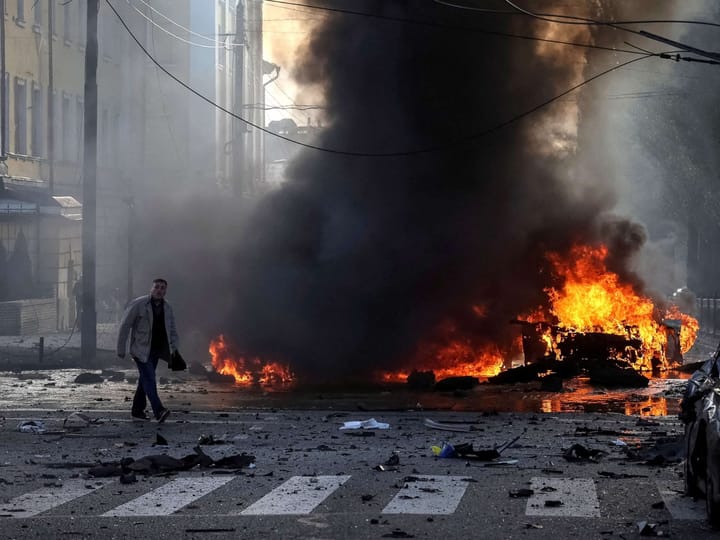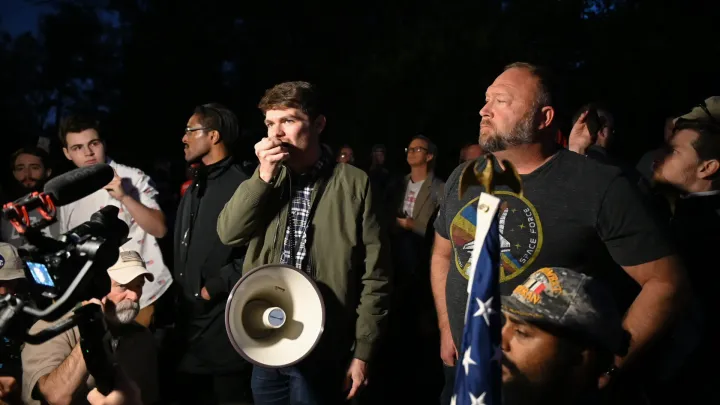The Most Privileged Lie in America
Anti-vaxx isn’t skepticism. It’s a luxury belief built on borrowed immunity.

In Texas, measles vaccination rates among babies surged as an outbreak spread. NBC News reported the spike; Alex Griswold noted the irony. Anti-vaxx, he points out, is a luxury belief—a position made tenable only by the unspoken assumption that other people will do the vaccinating. In other words, you can opt out of responsibility because you assume others won’t.

This isn’t new. It’s a recurring feature of social risk: people behave as though safety is ambient, not engineered. And that belief is what enables denial. You don’t have to believe the fire alarms work as long as you trust someone else already checked the batteries.
Inevitably, frustratingly, this turns into free-riding. Herd immunity is supposed to protect the vulnerable: infants, immunocompromised individuals, the elderly. But the moment it begins to function, it invites neglect. Once the danger fades from view, so does the urgency. When a disease is rare, it feels safe to gamble.
And if you gamble and win?
The logic feels validated.
But what if you lose?
Anti-Vaxx as Social Signaling
The "luxury belief" framing matters. Rob Henderson coined the term to describe beliefs that function as status symbols—conveying social class, identity, and tribal belonging without directly affecting the people who hold them. In this case, rejecting vaccines while trusting your child will never be exposed to a disease that requires one.
We imagine disinformation as a symptom of ignorance. But more often, it’s a symptom of insulation. If you live in a community with 98% vaccination rates, you can afford to be the 2%. You can post wellness memes about "natural immunity" and still get herd immunity as a side effect. Your child is statistically safe, not because of your parenting, but in spite of it.
In lower-income communities, vaccine skepticism exists too, but it often stems from different roots: mistrust of institutions, historical medical abuses, or practical barriers like access and transportation. What makes affluent anti-vaxxers distinct is their belief that they are the ones questioning the system, when in fact they’re coasting on its success.
The Moral Mathematics of Epidemics
Herd immunity isn’t a fixed threshold. It’s a gradient. Diseases vary in transmissibility, and populations vary in immunity. The line between containment and catastrophe isn’t clean. It’s probabilistic. For measles—a virus with an R0 as high as 18—you need 95% or more of the population immune to prevent outbreaks.
That means even small dips in vaccination rates can have outsized effects. A few percentage points lost, and suddenly the math tips. The pathogen doesn’t have to get smarter. It just needs more hosts.
This is where the luxury of anti-vaxx belief begins to look less like a personal choice and more like sabotage. Not intentional sabotage, maybe. But structurally, it functions the same. It takes a public good—collective immunity—and turns it into a personal indulgence.
You can afford to be wrong when the world is doing the work of being right. But once enough people decide to take the same bet, the odds collapse. Suddenly you’re not free-riding. You’re in free-fall.
Pandemic Memory Loss
You’d think COVID would have changed this. For a while, it did. People remembered what epidemics feel like. They felt the fear, the uncertainty, the rapid cascade from complacency to catastrophe.
And yet.
Months passed, and the trauma didn’t sharpen our instincts. It dulled them. The longer people lived under pandemic conditions, the more they adapted to dysfunction. They stopped being shocked by death tolls. They got used to masks, to remote funerals, to overstretched ICUs. And with that acclimation came denial - almost as performance.
The backlash started with COVID vaccines. Despite historic efforts, despite millions of lives saved, large segments of the population turned on the only tools that brought the crisis under control.
Why? Because the vaccine's success rendered its own urgency invisible. If it works, then the pandemic is over. And if it’s over, why take the shot? The mind invents fictions to justify avoidance. Conspiracy theories aren’t randomly distributed. They cluster wherever responsibility feels heavy and social trust runs low.
The Economics of Externalized Risk
Vaccination is a classic example of what economists call a positive externality—an action that benefits not just the individual but the broader society. But when the benefit is diffuse and the cost is immediate (however minor), rational self-interest starts to erode cooperation.
This is the tragedy of the commons, redrawn in immunological terms. Each person who chooses not to vaccinate imposes a small, cumulative burden on the group. Alone, it’s negligible. In aggregate, it’s disaster.
To maintain herd immunity, you need high compliance with low tolerance for exceptions. But we’re bad at enforcing that kind of discipline for long. Our brains aren’t built for abstract threats that can be postponed indefinitely. We’re reactive creatures. And reactive systems collapse slowly, then all at once.
The result is a cycle: success breeds complacency, which breeds fragility, which invites failure. And then we act surprised.
The Philosophy of Collective Action
The vaccination debate isn’t a question of science. It’s a question of cooperation, and what we owe each other. Vaccines work at the level of populations. They protect communities, not individuals. And that makes them a test of civic trust.
To vaccinate is to place a small bet on the future, and to trust that others will do the same. It’s a gamble, yes, but a coordinated one. Your immunity helps others. Their immunity helps you. It’s the mutualism of modernity, codified in public health protocols.
But lately, every collective action has started to feel suspect. Who are these "experts"? Why should I listen? What are they hiding? The language of public health becomes reinterpreted as control, not coordination. And the machinery of solidarity gets mistaken for coercion.
Who Gets to Opt Out?
What makes it all so brittle is how unequal the burden becomes. Not everyone gets the same leeway to make these choices. An affluent parent who skips a vaccine because of "gut instinct" faces few consequences when the community uptake is high. But a child in a poor neighborhood with poor access to healthcare and low community coverage? Their odds are worse - through no fault of their own.
So the luxury belief isn’t just a personal delusion. It’s a redistribution of risk. It transfers danger from those with options to those without. From the people choosing to free-ride to the people holding the line.
And there is no way to opt out of that dynamic. Not really. Not for long.
After the Collapse
When outbreaks happen, belief systems crash into reality. Abstract arguments about personal freedom and parental choice meet the epidemiological wall. The virus doesn’t care what you believe. It just spreads.
In Texas, the measles outbreak didn’t change minds because of new data. It changed behavior because the illusion broke. Suddenly, vaccination wasn’t a theoretical debate. It was a protection you could no longer afford to forgo.
And so vaccination rates soared. Not out of principle. Out of fear.
Which raises the uncomfortable possibility that fear might be the only thing left that still works.
The Fragile Infrastructure of Trust
We live in a paradox. Our systems are safest when they’re taken seriously, but they work best when they’re invisible. Public health is most effective when you never think about it. Which is precisely what makes it so vulnerable.
You see it in cybersecurity. In disaster preparedness. In climate resilience. We only appreciate the structure once it breaks.
Until then, we treat it like wallpaper.
But public health was never wallpaper. It was scaffolding. And the more we chip away at it in the name of personal preference, the more we risk structural collapse.
What Now?
If anti-vaxx is a luxury belief, the solution isn’t better facts. It’s cultural counterprogramming. Make trust visible. Make solidarity prestigious. Reward participation, not just persuasion.
There are already models. School mandates. Travel requirements. Employer policies. They work because they make cooperation the default, not the exception. They make the socially responsible choice feel effortless.
But the deeper change has to be philosophical. We need to stop treating public goods as ambient guarantees. They’re not. They’re the outcome of invisible work. Of trust. Of people doing their part without applause.
It might not feel revolutionary. But we start treating mutual care as baseline—not as virtue, not as politics, but as sanity.
Because your neighbors’ vaccines only protect you if you believe enough in the system to do your part too.
The Index is a reader-supported, indie publication.
Now, more than ever, the world needs an independent press that is unencumbered by commercial conflicts and undue influence.
By taking out an optional founding membership, you can help us build a free, accessible, independent news platform firewalled from corporate interests.


